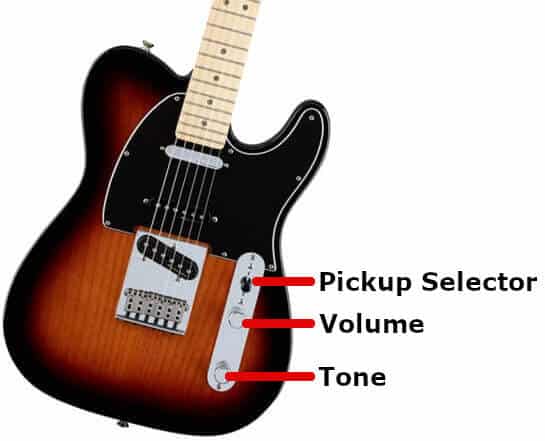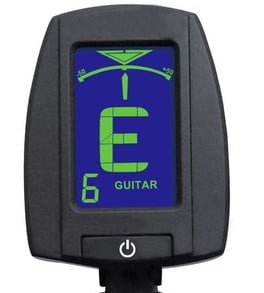Table of Contents
When the question “Why does my guitar sound bad?” arises, it’s essential to understand that many factors can influence a guitar’s sound quality.
Both novice and seasoned guitarists can face challenges with their instrument’s sound. Addressing these challenges requires identifying the common culprits behind the unsatisfactory sound.
This Killer Rig article will outline these issues and offer solutions to ensure your guitar produces the best sound possible.
Summary of Common Issues
- Technique: Proper fretting and picking are foundational to good sound.
- Strings: Old or corroded strings can diminish sound quality.
- Guitar Components: Cheap parts or a poorly set up guitar can affect tuning and sound.
- Pickups: Low-quality or improperly adjusted pickups can degrade sound.
- Electronics: Loose or faulty wiring can lead to sound disruptions.
- Tuning: An out-of-tune guitar will not produce the desired sound.
- Intonation: Incorrect intonation can make a well-tuned guitar sound off.
- Amplification: Incorrect amp settings can distort the guitar’s natural sound.
- Maintenance: Regular check-ups and setups can prevent many sound issues.
Technique Matters
One of the primary factors influencing the sound of a guitar is the player’s technique. Even with the best equipment, poor technique can lead to an unsatisfactory sound.
- Fret Hand Technique: Proper fretting is crucial. Pressing too hard or too lightly on the strings can cause buzzing or muted sounds. Ensuring that fingers are placed close to the frets, but not on top of them, can produce a clear tone.
- Picking Hand Technique: The way a guitarist picks or strums the strings plays a significant role in sound production. Holding the pick too tightly can lead to a harsh sound, while a loose grip might not produce a sound at all. It’s essential to find a balance and ensure that the pick strikes the strings at the right angle.
For beginners, it’s common to face challenges with both fretting and picking. Regular practice, along with guidance from experienced players or instructors, can help in refining technique, leading to a better sound over time.
Strings and Their Impact
The strings of a guitar play an incredibly large role in determining its sound quality. Their condition, type, and age can all influence the tones produced.
- Old Strings: Over time, strings lose their vibrancy. As they age, they can sound dull and lack the brightness of new strings. Regularly changing strings ensures that they remain responsive and produce a clear tone.
- Corrosion: Strings can corrode due to factors like sweat, humidity, and lack of use. Corroded strings not only sound bad but can also feel rough to the touch, affecting playability.
- String Choice: Not all strings are created equal. Different genres and playing styles may require specific types of strings. For instance, a jazz guitarist might prefer flatwound strings for a smoother sound. But a rock guitarist might opt for roundwound strings for a brighter tone.
It’s essential to choose the right strings for your playing style and to maintain them properly. Regular cleaning and timely replacement can significantly enhance the sound quality of your guitar.
Read my article on how often to change strings to learn more!
The Guitar Itself
The components and setup of a guitar seriously influence its sound quality. Each part, from the quality of materials used to the alignment of the neck, plays a role in producing the desired tones. Here’s a breakdown of some key aspects and their impact on sound:
| Aspect | Description | Impact on Sound |
|---|---|---|
| Cheap Guitars and Parts | Often made with budget-friendly components. | Can affect tuning stability and overall sound due to lower-quality components. |
| Worn-Out Frets | Frets that have seen prolonged use and show signs of wear. | Lead to buzzing, poor intonation, and a decline in sound quality. |
| String Action | The distance between the strings and the fretboard. | High action can cause difficulty in playing and intonation issues; low action can result in fret buzz. |
| Neck Alignment | The straightness and positioning of the guitar’s neck. | Misalignment can cause fret buzz, uneven string height, and intonation problems. |
| Bridge and Saddle | Components that support the strings and transfer vibrations to the guitar body. | Poorly set or worn-out bridge and saddle can affect string height, intonation, and resonance. |
Electronics and Pickups
The heart of an electric guitar’s sound lies in its electronics and pickups. These components capture the vibrations of the strings and convert them into electrical signals, which are then amplified.
A guitar’s voice, its clarity, warmth, and character, is critically influenced by the quality and setup of these elements.
Low-quality pickups, often found in budget guitars, can produce a sound that lacks depth and definition. It might come across as thin or muddy, missing the nuances of the player’s technique.
On the other hand, high-quality pickups can capture a wide range of frequencies, offering a fuller and more detailed sound.
The height of the pickups is another crucial factor. If they’re set too close to the strings, they can cause unwanted distortion due to the strong magnetic pull. Conversely, if they’re set too far, the resulting sound may be weak and lack punch.
Additionally:
- Loose or faulty electronics can introduce unwanted noise, such as buzzing or humming.
- Intermittent sound or a complete loss of signal can be a sign of wiring issues or faulty components.
Regular maintenance and checks can ensure the electronics are in top shape, and any necessary adjustments to the pickups can be made to optimize the guitar’s sound.
The Power of the Tone Knob
The tone knob on your guitar is a crucial tool for controlling your sound. It adjusts the brightness or darkness of your tone. It’s a primary suspect if your sound is too muddy or bright.
For a muddy or deep tone, your knob may be set too low, reducing high frequencies and creating a darker, less defined sound. Gradually turning it up can help restore clarity and brightness.
Conversely, if your sound is piercingly bright, your tone knob might be cranked too high. Lowering it can mellow out your sound and bring back some warmth.

Tuning and Intonation
A guitar’s tuning and intonation are fundamental to its sound. Even the most expertly played piece can sound off if the guitar isn’t tuned correctly or if its intonation is out of alignment. Do your chords sound bad when you play them?
Tuning refers to the pitch of each string. Each string on a guitar is designed to produce a specific note when played open. Over time, or after rigorous playing, these strings can drift from their intended pitches.
Regular tuning ensures that each string sounds its designated note. An out-of-tune guitar can immediately sound discordant, making even simple chords seem jarring.
Intonation, on the other hand, is about ensuring that each fret of a string produces the correct pitch. A guitar might be perfectly tuned when playing open strings, but if its intonation is off, fretted notes can sound out of tune.
This is especially noticeable when playing higher up the fretboard. Proper intonation ensures that the guitar sounds in tune across all frets.
Factors like string age, changes in temperature and humidity, and general wear and tear can affect both tuning and intonation.
Regular check-ups, using a reliable tuner, and occasional setups by professionals can help maintain the guitar’s pitch-perfect sound.

Amplification and Effects
Amplification and effects play a significant role in shaping the final sound that emanates from an electric guitar. While the guitar itself produces the foundational tones, amplifiers and effects pedals can enhance, modify, or even transform these tones.
- Wrong Guitar/Amp Settings: Every amplifier offers a range of settings that can adjust the tone, volume, and other sound characteristics. Using the wrong settings can lead to a sound that’s either too sharp, too muddy, or just not right for the intended style.
- Effects Pedal Settings: Effects pedals add layers to the guitar’s sound, from reverb and delay to distortion and modulation. However, overusing or improperly setting up these effects can overshadow the guitar’s natural sound or introduce unwanted noise.
- Mismatched Gear: Not all guitars, amplifiers, and effects are made to work seamlessly together. For instance, a guitar designed for heavy metal might not sound its best through an amplifier tailored for jazz.
It’s essential to understand the capabilities and characteristics of your gear. Experimentation, combined with knowledge, can lead to finding the perfect settings that bring out the best in your guitar sound.
Regularly updating and maintaining your gear, as well as seeking advice from seasoned players or professionals, can further enhance your sound experience.
External Factors
Various external factors can influence the sound of a guitar. From the environment in which it’s played to the way it’s stored, these factors can subtly or significantly alter the guitar’s tonality.
| Factor | Description | Impact on Sound |
|---|---|---|
| Environment | The acoustics of the room, humidity, and temperature. | Can affect resonance, sustain, and overall tonality. High humidity can also damage the guitar. |
| Maintenance | Regular cleaning, check-ups, and setups. | Ensures optimal sound and playability by preventing issues before they arise. |
| Storage | How and where the guitar is stored when not in use. | Improper storage can lead to warping, damage, and changes in sound quality. |
| Handling | How the guitar is handled, including transportation. | Rough handling can lead to physical damage, affecting sound. |
| Use of Accessories | Use of capos, slides, or other accessories. | Can modify the sound, pitch, and tonality of the guitar. |
Being aware of these external factors and managing them effectively can help in maintaining the guitar’s sound quality and overall health.
Use the Right Pick
Sometimes, achieving the perfect guitar sound isn’t about the big things! Like the guitar itself, the amp, or the pedals. It could come down to a piece of equipment as small and unassuming as the guitar pick.
Yes, that little triangle of plastic (or metal, or bone, or whatever material you prefer) can make a substantial difference in your guitar’s sound.
Different pick materials can produce varied tones. For example, a metal pick will produce a brighter, more precise sound. While a wooden pick will result in a warmer, softer tone. The shape and thickness of the pick also come into play.
Thinner picks, which are more flexible, can produce a brighter, sharper sound. Thicker picks, on the other hand, give a more rounded, fuller tone.
If you’ve been using the same pick for ages and are unsatisfied with your sound, try experimenting with different picks. Switch up the material, thickness, or shape and see how your sound changes. You might be surprised at the difference a small piece of plastic can make.

Conclusion
Achieving the perfect sound from a guitar is a blend of various factors, both intrinsic to the instrument and external.
Each component contributes to the final sound, from the player’s technique to the quality of the guitar’s parts, settings for amplifiers and effects, and the environment in which it is played.
The guitar will sound its best and remain a dependable and cherished instrument for years to come if these factors are understood and given the attention they require.
FAQs
I’ve tried everything, but my guitar still sounds bad. What should I do?
If you’ve exhausted all DIY fixes, it might be time to consult a professional. A good guitar tech can diagnose and fix complex issues that might be beyond your expertise.
Can the guitar pick really affect my sound that much?
Yes, it can! Different pick materials and thicknesses can substantially alter your guitar’s sound. Don’t hesitate to experiment with different picks to find your preferred tone.
How often should I get my guitar professionally set up?
It’s a good practice to get a professional setup at least once a year. However, if you play frequently or notice issues with sound quality, intonation, or playability, consider getting it checked sooner.

